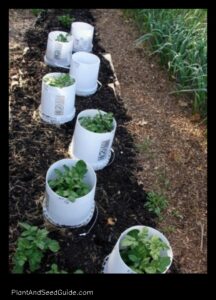When considering the best time to plant grass seed in Massachusetts, it is crucial to understand the unique climate and soil conditions of the region. Massachusetts experiences distinct seasonal variations in temperature and precipitation, impacting the ideal timing for successful grass growth. By leveraging the state’s climate patterns, you can ensure that your lawn thrives and remains vibrant throughout the year.
- Explore the benefits of planting cool-season grasses in Massachusetts, known for their ability to thrive in the state’s climate.
- Discover the characteristics of warm-season grasses and their suitability for specific regions within Massachusetts.
Choosing the right grass seed variety is essential for a healthy lawn. Different grass types are well-suited for Massachusetts’ climate and soil conditions. By selecting the appropriate grass seed, you can set the foundation for a lush and resilient lawn that withstands the challenges of the local environment.
Understanding Massachusetts Climate
When it comes to understanding the climate in Massachusetts, it’s crucial to grasp the seasonal variations that play a significant role in determining the best time to plant grass seed. From the chilly winters to the warm summers, Massachusetts experiences diverse weather conditions that directly impact the growth of grass on your lawn. By delving into the nuances of Massachusetts’ climate patterns, you can strategically plan the ideal timing for planting grass seed to ensure a lush and healthy lawn.

Choosing the Right Grass Seed
When it comes to choosing the right grass seed for your Massachusetts lawn, it’s crucial to consider the climate and soil conditions of the region. Different grass varieties thrive under specific circumstances, so selecting the most suitable seed is key to a successful lawn. Here are some important factors to keep in mind:
- Climate Adaptability: Consider whether the grass seed is suitable for Massachusetts’ climate, which experiences cold winters and warm summers. Cool-season grasses like Kentucky bluegrass and fescue are popular choices due to their ability to withstand the state’s temperature fluctuations.
- Soil Compatibility: Evaluate if the grass seed is compatible with Massachusetts’ soil conditions, which can vary across the state. Conduct a soil test to determine the pH levels and nutrient content, ensuring the grass seed you choose can thrive in the soil.
- Disease Resistance: Look for grass seed varieties that are resistant to common diseases in Massachusetts, such as brown patch and dollar spot. Opting for disease-resistant grass can help maintain a healthy lawn with minimal interventions.
By considering these factors and selecting grass seed that aligns with Massachusetts’ climate and soil characteristics, you can set the foundation for a lush and vibrant lawn that flourishes throughout the seasons.
Cool-Season Grasses
When it comes to planting grass in Massachusetts, cool-season grasses are a top choice for many homeowners. These grass varieties have adapted to thrive in the state’s climate, making them an excellent option for a lush and vibrant lawn. Let’s explore the benefits of planting cool-season grasses in Massachusetts:
- Adaptability: Cool-season grasses like Kentucky bluegrass and fescue can withstand the cold winters and fluctuating temperatures of Massachusetts.
- Quick Growth: These grass types germinate quickly in the cooler temperatures of early spring and fall, allowing for rapid establishment.
- Drought Resistance: Cool-season grasses have good drought tolerance, making them suitable for the occasional dry spells in Massachusetts.
- Year-Round Greenery: With proper care, cool-season grasses can provide year-round greenery, enhancing the overall appearance of your lawn.
By choosing the right cool-season grass variety and following proper planting and maintenance techniques, you can enjoy a beautiful and resilient lawn in Massachusetts. Consider the unique characteristics of each grass type to select the best option for your specific lawn needs.
Warm-Season Grasses
When it comes to warm-season grasses in Massachusetts, it’s essential to understand their unique characteristics and requirements for successful growth.
These grass varieties are well-suited for regions with hot summers and mild winters, making them a popular choice for certain areas of the state..
Here are some key points to consider when choosing and planting warm-season grasses:
- Adaptability: Warm-season grasses like Bermuda grass and Zoysia grass are known for their heat tolerance and ability to thrive in the summer months.
- Growth Patterns: These grass varieties have different growth patterns compared to cool-season grasses, requiring specific care and maintenance practices.
- Establishment Time: Warm-season grasses may take longer to establish compared to cool-season grasses, so patience is key during the initial growth phase.
When planting warm-season grasses in Massachusetts, it’s important to consider the specific microclimates within the state and choose grass varieties that are well-suited for the local conditions. By understanding the unique characteristics of warm-season grasses and providing the right care, you can achieve a lush and vibrant lawn that thrives in the summer heat.
Preparing Your Lawn for Planting
Preparing your lawn for planting grass seed in Massachusetts is a crucial step in ensuring the success of your lawn. Before you start planting, it’s essential to assess the condition of your soil and make necessary amendments to create an optimal growing environment. Conducting a soil test will provide valuable insights into the nutrient levels and pH balance of your soil, allowing you to adjust accordingly.
Once you have determined the condition of your soil, it’s time to prepare the area for seeding.
Consider aerating the soil to improve drainage and ensure better seed-to-soil contact for germination.Clear any debris, rocks, or weeds from the planting site to provide a clean and even surface for the grass seed..
After preparing the soil, consider applying a high-quality fertilizer to provide essential nutrients for the new grass seed. Choose a fertilizer that is suitable for the grass type you are planting and follow the application instructions carefully. Proper fertilization will promote healthy growth and establishment of the grass.
Soil Testing and Amendment
When it comes to for planting grass seed in Massachusetts, it is crucial to understand the composition of your soil to ensure optimal grass growth. By conducting a thorough soil test, you can determine the pH levels, nutrient deficiencies, and overall health of your soil. This information is essential for making informed decisions on soil amendments and fertilization strategies.
Here are some key steps to follow for in Massachusetts:
- Perform a soil test to assess pH levels and nutrient content.
- Based on the test results, determine the necessary amendments such as lime or fertilizer.
- Adjust the pH levels of the soil to fall within the ideal range for grass growth.
- Consider organic amendments to improve soil structure and fertility.
- Regularly monitor the soil health and make adjustments as needed throughout the growing season.
By taking the time to properly test and amend your soil, you can create a strong foundation for your grass seed to thrive and establish a lush, healthy lawn in Massachusetts.
Proper Planting Techniques
When it comes to proper planting techniques for grass seed in Massachusetts, there are several key factors to consider to ensure successful establishment and growth of your lawn.
This will help achieve optimal coverage and density for a lush green lawn.One of the essential practices is to determine the appropriate seeding rate based on the type of grass seed you are using and the size of your lawn..
Another crucial aspect is following a consistent watering schedule to keep the soil moist but not waterlogged. Adequate watering is essential, especially during the germination period, to support healthy root development and overall growth. It’s important to monitor the moisture levels regularly and adjust your watering routine accordingly.
In addition to seeding rates and watering, proper maintenance is key to nurturing your newly planted grass seed. This includes regular mowing at the correct height to promote strong root growth and discourage weed competition. Fertilizing at the right time and with the appropriate nutrients will also contribute to the health and vigor of your lawn.
Frequently Asked Questions
- When is the best time to plant grass seed in Massachusetts?
The optimal time to plant grass seed in Massachusetts is during the late summer to early fall. This period allows the seeds to establish before the harsh winter sets in, promoting healthy root development for a lush lawn in the spring.
- What types of grass seed are suitable for Massachusetts?
Cool-season grasses like Kentucky bluegrass and fescue are well-suited for Massachusetts due to their ability to withstand the state’s climate. These grass varieties thrive in the cooler temperatures and moderate precipitation typical of the region.
- How should I prepare my lawn for planting grass seed?
Before planting grass seed in Massachusetts, it is essential to conduct a soil test to determine nutrient levels and pH balance. Proper soil amendment and adequate fertilization are crucial for creating an ideal environment for successful grass growth.
- Wild Rose Country: Exploring Untamed Beauty - July 15, 2024
- Wildflower Nursery Decor: Bringing Nature Indoors - July 15, 2024
- Young Sprout of Grass: Nurturing New Life - July 15, 2024








